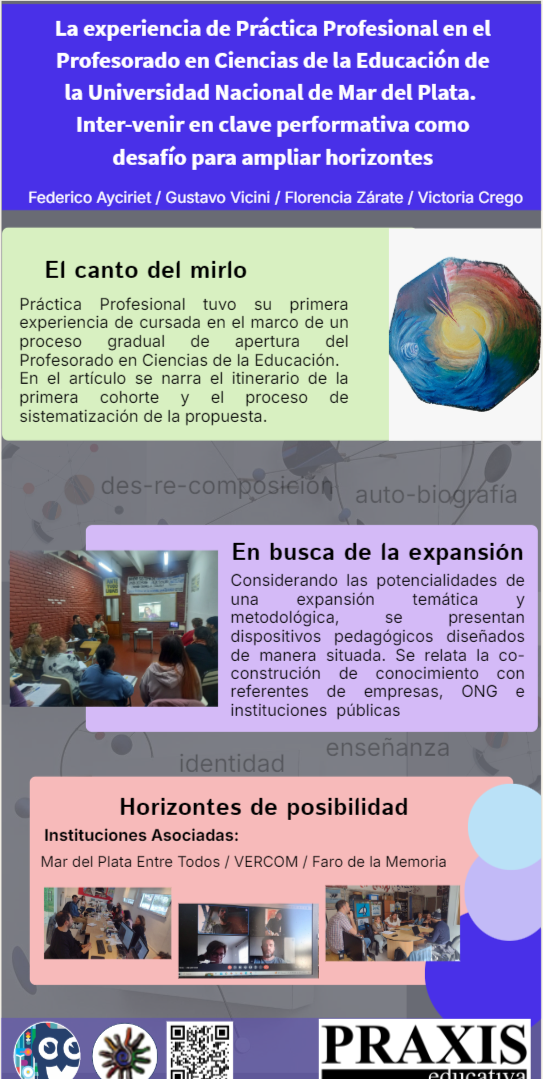The experience of Práctica Profesional in the Teacher Education Program in Education Sciences at Universidad Nacional de Mar del Plata. Inter-coming in performative key as a challenge to broaden horizons
DOI:
https://doi.org/10.19137/praxiseducativa-2024-280304Keywords:
professional practice, education sciences, teacher education, intervention, narrativeAbstract
This article is an exercise of de/re-composition of the experience of the opening course of the curricular space “Práctica Profesional” corresponding to the fifth year of the Teacher Education Program in Education Sciences of Humanities School at Universidad Nacional de Mar del Plata. It is an account of the development of the proposal, including contextual conditions, definitions, and criteria that guided the movement that meant the implementation of the subject that serves as a corollary of the course. Throughout the story, the paper characterizes the subject within the framework of the teacher's curriculum, explains the theoretical and methodological foundations that support the proposal, and describes the training devices that have been designed considering the contextual conditions in which the course took place.
Downloads
References
Alen, B. (2009). Los dispositivos de acompañamiento a los docentes noveles. Alen, B. y Allegroni, B. Acompañar los primeros pasos en la docencia, explorar una nueva práctica de formación, 33-60.
Anijovich, R., Cappelletti, G., Sabelli, M. J., & Mora, S. (2021). Transitar la formación pedagógica: dispositivos y estrategias. Tilde editora.
Ayciriet, F. (2023). Socialidad y condición sensible desde los gestos para pensar la práctica profesional docente: Lo íntimo como relato emergente. Saberes Y prácticas. Revista De Filosofía Y Educación, 7(2), 1–11. https://doi.org/10.48162/rev.36.073
Berardi, F. (2017). Fenomenología del fin: sensibilidad y mutación conectiva. Caja negra.
Carr, W. (1996). Una teoría para la educación: hacia una investigación educativa crítica. Ediciones Morata.
Cerecero Medina, I. E. (2019). Diez modelos relacionados con la práctica reflexiva. OPENAIRE.
Davini, M. C. (2015). Acerca de las prácticas docentes y su formación. Argentina: Ministerio de Educación. Instituto Nacional de Formación Docente. Dirección Nacional de Formación e Investigación. Área de Desarrollo Curricular.
Despret, V. (2022). Habitar como un pájaro: modos de hacer y pensar los territorios. Editorial Cactus.
Flores, V. (2017). Interruqciones, ensayos de poética activista. Editorial Asentamiento.
Guber, R. (2008). Antropólogos-ciudadanos (y comprometidos) en la Argentina. Las dos caras de la ‘antropología social’en 1960-70. Journal of the World Anthropology Network, 3, 67-109.
Kac, E., & Kafensztok, R. (1996). Abraham Palatnik, Pioneer of Kinetic Art. Leonardo, 29(2), 120-121.
Porta, L. (2021). La expansión biográfica. Buenos Aires. EUDEBA.
Porta, L. y Alvarez, Z. (2019). La narrativa biográfica como magma de significaciones y cristalizaciones de sentidos en Pasiones María Cecilia Colombani. Mar del Plata: EUDEM
Porta, L., Álvarez, Z., & Yedaide, M. M. (2012). Pasión por enseñar. Emociones y afectos de profesores universitarios memorables. Revista Científica Alternativas. Espacio Pedagógico, 283.
Ramallo, F., & Porta Vazquez, L. G. (2017). Las historias en la educación y los otros mundos posibles. Universidade Estadual do Rio de Janeiro; Revista Artes de Educar.
Ramallo, F., Berengeno, L., & Yedaide, M. M. (2021). El placer en la investigación en educación: Tránsitos afectivos y afectantes como eróticas del rigor. Revista Interinstitucional Artes de Educar, 7(1), 488-510.
Schon, D. A. (1992). La formación de profesionales reflexivos: hacia un nuevo diseno de la ensenanza y el apredizaje en las profesiones. Paidós.
Sanjurjo, L. , Caporossi, A., España, A. E., Hernández, A. M., Iris, A., & Foresi, M. F. (2009). Los dispositivos para la formación en las prácticas profesionales. Rosario (Argentina): Homo Sapiens Ediciones.
Souto, M (2019) Acerca de la noción de dispositivo en la formación universitaria. Educación, Lenguaje y Sociedad EISSN 2545-7667 Vol. XVI Nº 16 (Abril 2019) pp. 1-16 DOI:http://dx.doi.org/10.19137/els-2019-161602

Published
Issue
Section
License
Copyright (c) 2024 Federico Ayciriet, Gustavo Vicini, Florencia Zarate, Victoria Crego

This work is licensed under a Creative Commons Attribution-NonCommercial-ShareAlike 4.0 International License.
Copyright Notice
Editorial Committee Educational Praxis Magazine:
I hereby declare that I am the author of the article titled (article name), that it is original and my own and that it was not previously published in any other format or medium. I declare to know that the magazine will not charge me any type of fee under any circumstances, nor will I receive any type of monetary compensation If it were accepted for publication in Educational Praxis, I authorize the aforementioned magazine to publish it digitally and to advertise it on its social networks.
If the work is published, I adhere to the Creative Commons license called "Attribution - Non-Commercial Share Alike CC BY-NC-SA", through which it is allowed to copy, reproduce, distribute, publicly communicate the work and generate derivative works, as long as when the original author is cited and acknowledged. This license has been used since September 2018. In 2016 CC BY NC ND 4.0 was adhered to; and in the years 2017 and 2018 (January-August) CC BY NC 4.0.
This CC BY-NC-SA Share Alike license does not, however, permit commercial use of the work. As an author, the journal may establish additional agreements for the non-exclusive distribution of the version of the work published in the journal, it allows me to self-archive the published articles, in their post-print version, in institutional, thematic repositories, personal web pages or any other relevant use. with the recognition of having been first published in this journal.
Educational Praxis adheres to DORA (Declaration on Research Assessment) signed in San Francisco, California, on December 16, 2012, and to the Declaration of Mexico (Joint Declaration LATINDEX - REDALYC - CLACSO - IBICT).














_(1)2.png)


3.png)











_(2).png)






2.jpg)









